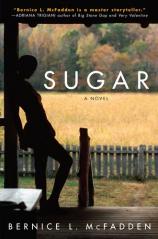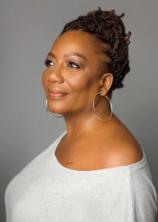Excerpt
Excerpt
Sugar

JUDE was dead.
On a day when the air held a promise of summer and people laughed aloud, putting aside for a brief moment their condition, color and where they ranked among humanity, Jude, dangling on the end of childhood and reaching out toward womanhood, should have been giggling with others her age among the sassafras or dipping her bare feet in Hodges Lake and shivering against the winter chill it still clutched. Instead she was dead.
She'd been taken down by the sharp blade of jealousy, and her womanhood-so soft, pink and virginal-was sliced from her and laid to rest on the side of the road near her body. Her pigtails, thick dark ropes of hair, lay splayed out above her head, mixed in with the pine needles and road dust. Her dress, white and yellow, her favorite colors, was pulled up to her neck, revealing the small bosom that had developed over the winter.
The murder had white man written all over it. (That was only a half truth.) But no one would say it above a whisper. It was 1940. It was Bigelow, Arkansas. It was a black child. Need any more be said?
No one cared except the people who carried the same skin color. No one cared except the parents who had nursed her, stayed up all night soothing and rocking her when she was colicky. Applauded her when she took her first steps and cried when the babbling, gurgling sounds that came from her sweet mouth finally formed the words Mamma and then later, Papa.
They cared. The parents of sweet, sweet Jude, who would never hurt a fly, no less a human being. Look at what they did to her!
Word first came via the Edelson boy. He'd run all the way and was breathless when he arrived. Black John, the blacksmith, had found her about a mile down the road and covered her body with a Crocker sack while he put himself in the right frame of mind to start coming. He had to pop the boy upside the head, twice, this just to get him moving instead of gawking.
Black John remained behind, gathering the broken child into his arms and placing her gently in his wagon among the bags and crates of field provisions. He stood looking at the beaten body of this almost woman. In life, she was a tall child, strapping, like her father, but in death, she seemed so small. Perhaps it was because of her broken bones and the way her skin sank in the places between the breaks that made her look so tiny and uneven.
He shook his head in pity and looked up into the heavens for an answer. An arrow of blackbirds blinded the sun and then moved on. If that was clarification of why and what lay ahead, Black John never said, but he would think back on this day again in fifteen years' time.
His wife had helped birth this child, as she had most of the Bigelow children. She would take it hard, like she'd lost one of her own. He looked back at the child again and a heavy sigh escaped him. "No rest for the weary," he muttered and then couldn't think of why that would come to mind at all.
He was procrastinating. Standing there behind his wagon of potatoes, turnips, cabbage, yam and Jude, he was stretching the space between his arrival and the scene that would follow. Crying eyes and screaming mouths. He'd seen plenty of grief in his life. But grief let loose from a woman who lost a child-that was the worst type of grief of all. If you could, you'd try to avoid that sort. Because grief that comes from loss of child just took a piece of you away each time you met up with it.
And if you found yourself among it too often for too long, you'd certainly die way before your time.
No, Black John was in no hurry to go.
The sun sat watching curiously on its perch, delaying its descent into late afternoon. It was long past three and Black John's shadow stood stout before him, watching and waiting. He removed his straw hat, the one that belonged to his daddy before him. The one that he inherited when his uncle handed it to him with a quiet word. Black John could never remember the exact word that was spoken, but it left an emptiness in him. The strawberry-colored stain stiffening the center part of the hat's hump confused him more than scared him because his daddy hated strawberries. Black John fingered the stain and looked back at the dead child, her dress blotched with her own strawberry stains. "Well," he muttered in resignation, as he pulled his handkerchief from his pocket and wiped the sweat from his brow and the back of his neck.
He moved to the cab of the truck and removed a second empty Crocker sack from the floor. Returning to Jude he looked her over once again and shook his head in pity and then tucked the Crocker sacks around her body and went to the left of the wagon. That's when he saw it. Glistening in the sun. His shadow stepped forward and shaded the glare. Black John knew immediately what it was, although he had never seen one without a woman's support, protection and guidance behind it; something like that, once seen, always known. He leaned down and with the sweat-soiled handkerchief retrieved Jude's womanhood. He would later recount (and he often did) how it quivered in the palm of his hand.
His mule closed the distance in a slow saunter that barely disturbed the road dust. Black John looked over and his shadow looked back at him. Ahead he could see the small pond of black faces, eyes big with wanting to know, eyes big with wanting to see. Black John rode right into the middle and when he stepped down from his wagon he was six years old again, his father's straw hat, with the strawberry stain stiff and dry on its hump, in his hands. He pushed through the worn and patched sea of skirts, fought through the tree-long legs of men and bit down hard on a hand that tried to cover his too-young-for-death eyes. When he made it to the clearing there was his father. Beaten so hard and for so long that his skin had bubbled up purple. The top of his head was open and there he saw precious memories and somehow-someday dreams wrapped in I Love You colors spilled out for all of Bigelow to see. Then came the wail and Black John lost a little bit of his time on earth.
That's what scared him now. The silence. The absence of that mournful homage that broke your heart, stole time from Black John and pushed the most pious to question God.
Pearl's mouth hung open, but no sound came. Her heart had broken into tiny pieces that rose up, plugging her throat, allowing only breath to pass.
She tried again when Black John laid Jude's battered body to rest at her feet, the beaten, brutalized, eyeless body of her baby girl; but all she could do was claw at her own eyes and scratch at her throat, drawing blood instead of sound. Pearl was fighting. Fighting with the reality that there would be no more candy sweet kisses and hugs that could magically erase a problem, worry or fear. In the halls of their home, who would skip, dance and sing so loud that the dogwoods raised their branches in delight?
Who would call her "Mamma honey baby" in that teasing, innocent voice that only Jude possessed?
And there would no longer be a reason for her to answer: "Jude baby doll." These thoughts ran through her mind until her head ached with grief. Searing hot tears fell heavy from her eyes and landed on her bosom, soaking through the black cotton dress and white brassiere, stinging her skin and scorching her heart. The pain. The pain!
Later, she turned her face toward the heavens, unable to bear the sight of the sorrow-faced men as they covered her baby's coffin with brandy brown dirt. She had prepared herself to be taken from the earth at the very moment she heard the muffled sound of the first shovelful hit the top of the small wooden box. She had asked the Lord to release her from this life and allow her to walk beside her sweet Jude as she entered the Kingdom of Heaven.
But with each shovelful of earth, the sound that marked where Jude lay, quieted, and with the last sprinkling Pearl swayed suddenly and was aware of being lifted from the ground. She smiled, believing the Lord had answered her prayers. She quickly opened her eyes to take in, for what she thought to be the last time, the faces of her husband and two sons. And they were there, faces pinched with concern and grief, as they hoisted her up and carried her limp body away from graveside.
She lay in bed for nearly thirty days, taking in very little food or water. Calling for Jude and crying when her call was not answered and still, as she wallowed in grief and anguish, the sorrowful wail that was reserved for mothers who've lost their only daughters, remained locked in her throat.
Pearl eventually returned to her life. Now absent of Jude. People stopped talking about it and allowed the matter to slip into the space in their minds reserved for horrors like those. She attempted to do the same, putting her pain not behind her, but beside her, where her sweet Jude should have been, and prayed not for redemption, but for salvation.
No, the Lord would not answer her prayers on that day. Not as she had wished. She did not die. Not physically. Her soul and spirit had departed our world the moment she touched the cold, bruised brow of her child. But God would keep her walking and breathing for quite a few more years to come. He had work for her to do.
Excerpted from Sugar © Copyright 2012 by Bernice L. McFadden. Reprinted with permission by Plume. All rights reserved.
Sugar
- paperback: 240 pages
- Publisher: Plume
- ISBN-10: 0452282209
- ISBN-13: 9780452282209



